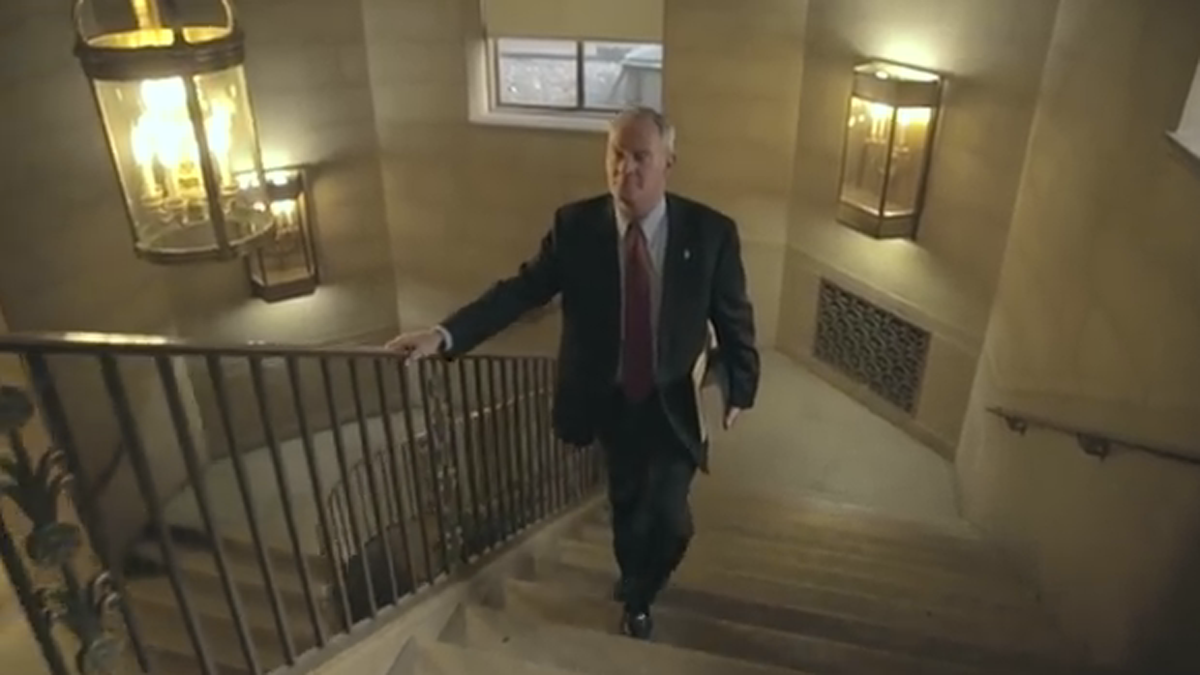Pa. Supreme Court race eerily quiet
Listen
TV ad for Pennsylvania Supreme Court candidate Kevin Dougherty
It’s probably one of the most consequential and, so far, least noticed races in the state’s history.
The battle for three seats on the Pennsylvania Supreme Court will determine the partisan balance on the court, perhaps for years to come.
But with the election less than a month away, it’s been a strangely quiet race.
The big, so far unanswered, question is whether national conservative groups will come in with a big money independent spending campaign to try and ensure a win for the seriously underfunded Republican slate of candidates.
There are wisps of rumors that Americans for Prosperity, associated with the Koch brothers is either buying TV ad time, or about to.
As of this writing late Thursday, I couldn’t find any hard evidence of it, but those who watch spending in judicial elections say it wouldn’t be the first time such groups came in hard with a fourth-quarter push.
“Very often, these groups will come in and spend at the very last minute,” said Matthew Menendez of the Brennan Center for Justice. “And so the fact that they aren’t spending yet should not be read as an indication that they won’t.”
State races become national
If you look at the fundraising numbers so far, you’d think it’s the Democrats — David Wecht of Allegheny County, Philadelphia’s Kevin Dougherty (yes, the brother of labor leader John Dougherty), and Christine Donohue — who are the rich guys in this race.
They’ve raised a combined $5.3 million so far, compared with about $1.4 million for Republicans Michael George, Ann Covey and Judith Olson.
There’s also an independent, Paul Panepinto of Philadelphia.
Pennsylvania Republican consultant Mark Harris said it’s common for Democratic judicial candidates to have a little easier time raising money.
“They have a reliable pool of donors in trial lawyers and unions,” Harris said, “while Republicans often have to raise from businesses and individual donors, one at a time.”
But national conservative groups, including the U.S. Chamber of Commerce, the Republican State Leadership Committee and Americans for Prosperity have been spending in state supreme court races in a lot of states in recent years, essentially nationalizing state court races.
It makes sense, politically.
State justices rule on matters of critical interest to political parties, such as voter access and legislative redistricting, and the Citizens United ruling and other decisions have increased the flow of money in politics, Laurie Kinney of the nonprofit Justice at Stake, which tracks spending in judicial elections, says national spending in state court races has become “the new normal.”
Silence is golden?
Democratic strategist Dan McElhatton Jr. offered an explanation for the lack of conservative intervention in the election. He said off-year, low-turnout elections in Pennsylvania favor Republicans, so they don’t want to advertise and wake up sleeping Democrats.
“There would not be a reason for a Republican tactician to alert folks in Southeastern Pennsylvania that an election is happening,” McElhatton said. “They think that they can win this election simply by running out the clock.”
State Republican Party chairman Robert Gleason agrees the passive voter turnout pattern in this kind of election favors Republican candidates.
“It does. There’s no question about that,” Gleason told me. “There will be a very low turnout. So this election, like many in Pennsylvania, is a turnout election, and it’s not even necessarily about spending millions of dollars on television. It’s about having an effective turnout program.”
Gleason did say he thinks the door is still open for national conservative groups to come to the aid of the state’s GOP ticket.
I contacted all three of the prominent national conservative groups. The only one to get back was the U.S. Chamber of Commerce, which was courteous enough to get someone on the phone to say they don’t talk about their political strategy.
Meanwhile, an independent expenditure committee called Pennsylvanians for Judicial Reform has registered in Harrisburg. It’s raised about $360,000, mostly from unions and lawyers, and is expected to support the Democratic candidates.
What about those candidates?
While the Supreme Court race is about partisan advantage and political strategy, there are candidates who actually have records and views.
And that kind of matters, since two justices have left the court amid scandals involving the political use of court staff, alleged self-dealing and pornographic emails.
You can get a look at them yourself at a debate Wednesday at 5 at the Widener University Law School, sponsored by Pennsylvanians for Modern Courts, the League of Women Voters and others.I’ll be there, and hope to offer a bit more about the candidates in a future post.
WHYY is your source for fact-based, in-depth journalism and information. As a nonprofit organization, we rely on financial support from readers like you. Please give today.


